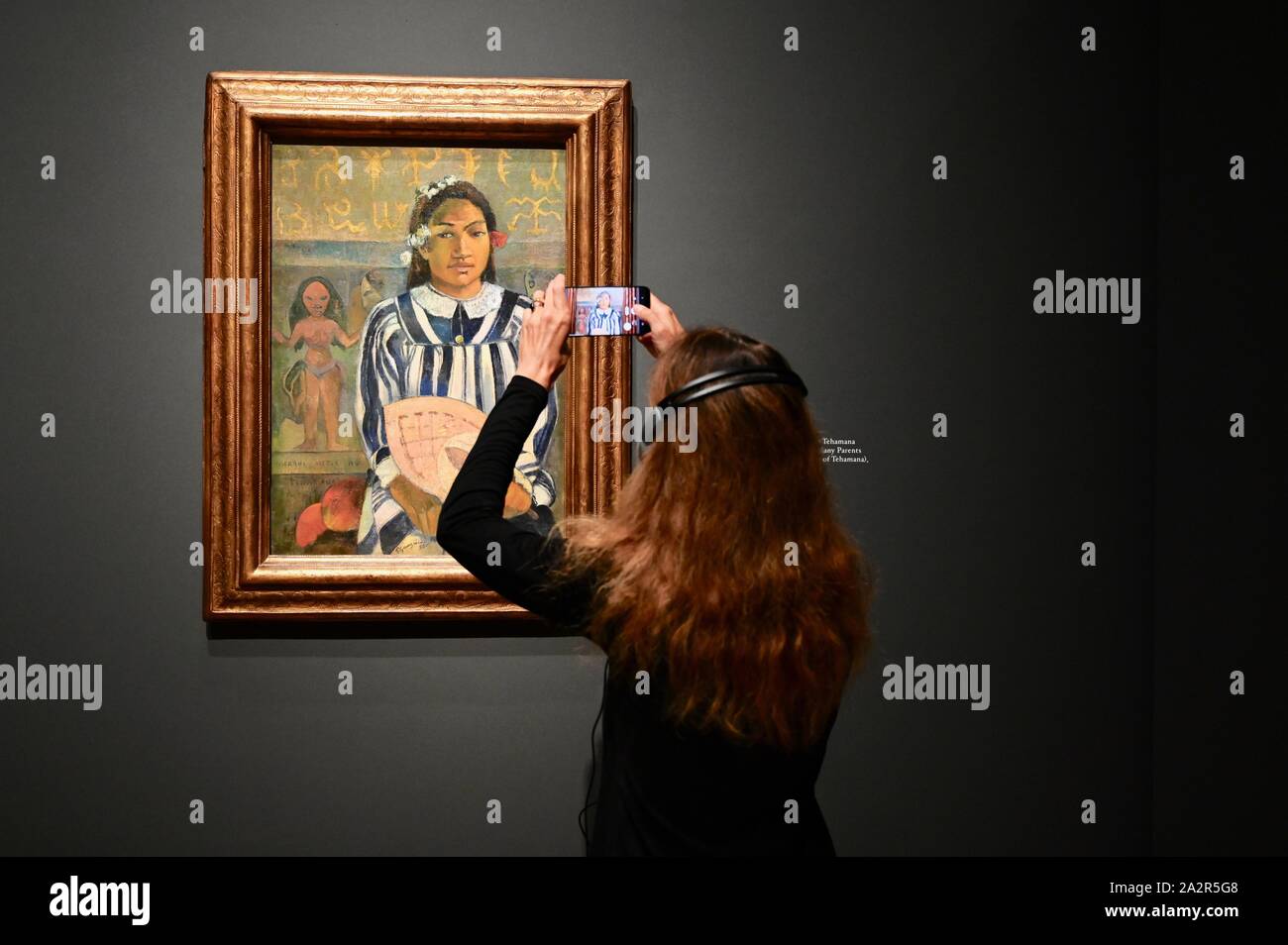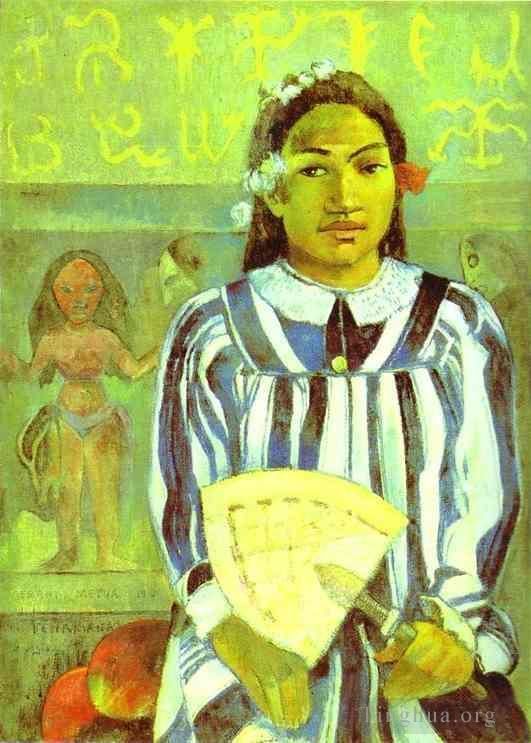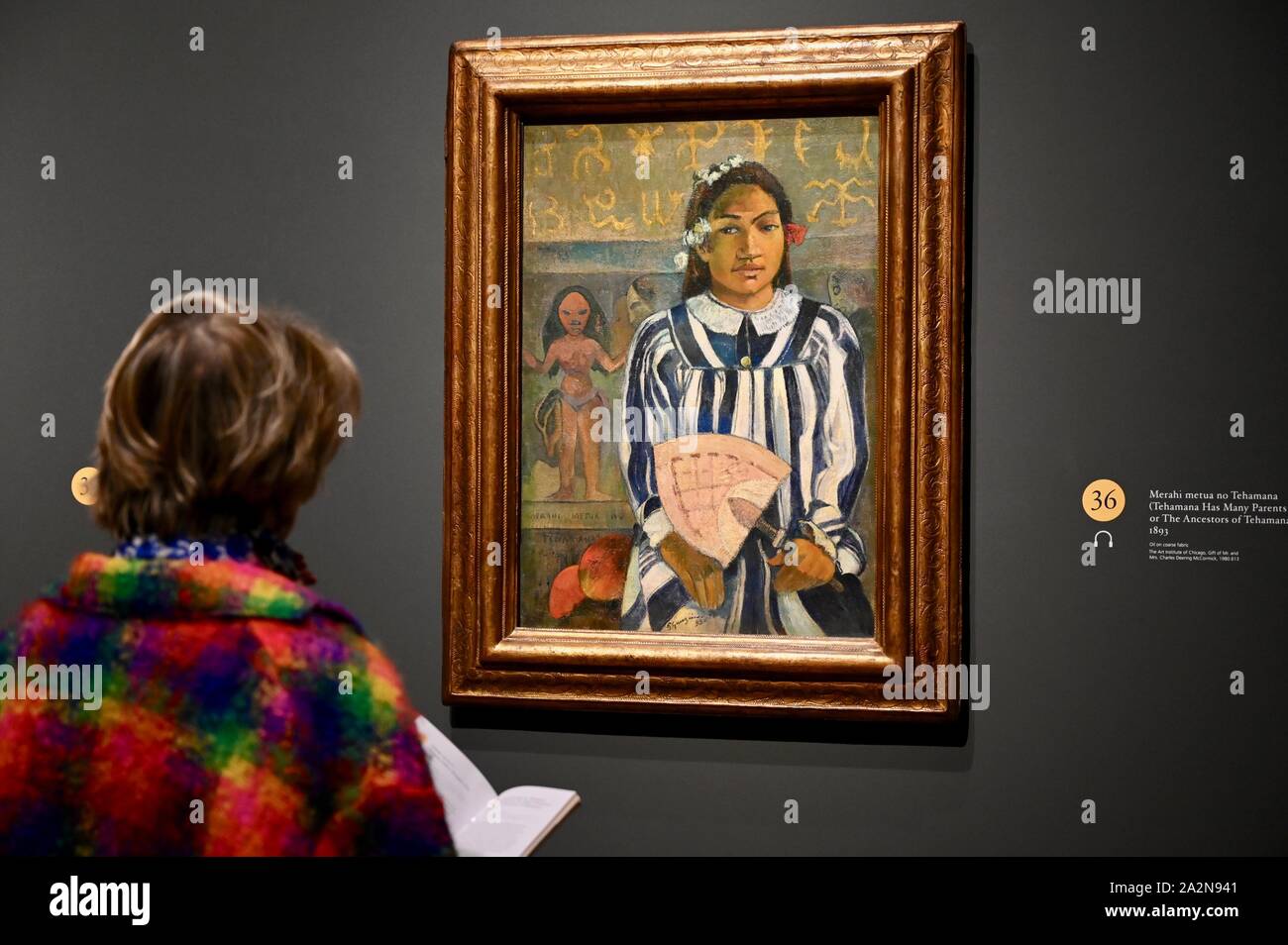
A woman photographing "Merahi metua no Tehamana" on her mobile phone. Gauguin Portraits, A
Merahi metua no Tehamana (English Tehamana Has Many Parents or The Ancestors of Tehamana) is an 1893 painting by the French artist Paul Gauguin, currently in the collection of the Art Institute of Chicago. The painting is a portrait of Paul Gauguin's native wife Teha'amana during his first visit to Tahiti in 1891-1893.

Merahi metua no Tehamana Ancestors of Tehamana Paul Gauguin Oil Painting for Sale
Merahi metua no Tehamana (English Tehamana Has Many Parents or The Ancestors of Tehamana) (1893). Oil painting. Art Institute of Chicago Warning The original file is very high-resolution. It might not load properly or could cause your browser to freeze when opened at full size. Summary[edit] artist QS:P170,Q37693 Details on Google Art Project Title

Tehura. Noa Noa. Epreuve unique gravée d'après le tableau Merahi metua no tehamana de Paul
An 1893 oil on canvas, Merahi Metua no Tehamana (Tehamana Has Many Parents or The Ancestors of Tehamana), by Paul Gauguin (1848-1903) the French post-impressionist painter. Painted in Tahiti, one of the final works completed by the artist there during his first visit. Tehamana was the teenage girl Gauguin lived with.

Merahi Metua No Tehamana by Paul Gauguin Kuriosis
Merahi metua no Tehamana (English Tehamana Has Many Parents or The Ancestors of Tehamana) is an 1893 painting by the French artist Paul Gauguin, currently in the collection of the Art Institute of Chicago. The painting is a portrait of Paul Gauguin's wife Teha'amana during his first visit to Tahiti in 1891-1893.

L’Œuvre à la Loupe Merahi metua no Tehamana de Gauguin Le blog d’art contemporain de KAZoART
Teha'amana - symbols and intrigue Instead, he went on to paint scenes and figures based on personal experience and his rather limited circle of acquaintances among the local Tahitians. Only one painted portrait survives in which he names the sitter as Teha'amana, his young Tahitian lover.

Merahi Metua No Tehamana the art institute of chicago Lustige Wallpaper
Merahi metua no Tehamana (Tehamana Has Many Parents or The Ancestors of Tehamana) by Paul Gauguin Paul Gauguin traveled to rural France and then abroad in search of inspiration for his art.

Merahi metua no Tehamana (Tehamana Has Many Parents or The Ancestors of Tehamana) by Paul Gauguin
Image above: Paul Gauguin, 'The Ancestors of Tehamana or Tehamana Has Many Parents (Merahi metua no Tehamana),' (detail), 1893; The Art Institute of Chicago, Gift of Mr. and Mrs. Charles Deering McCormick 1980.613 ©The Art Institute of Chicago. Sponsored by. Exhibition highlights.

Merahi Metua No Tehamana YouTube
Merahi Metua no Tehamana (The Ancestors of Tehamana or Tehamana has many parents) is a portrait by Gauguin painted in 1893. Tehamana has many parents, referring to her having her natural parents as well as foster-parents as per the Tahitian customs during the marriage. The art is currently at the Art Institute of Chicago.

A woman views "Merahi metua no Tehamana". Gauguin Portraits. A Credit Suisse Exhibition, The
In the painting 'Merahi metua no Tehamana', which in English can translate to either 'Tehamana Has Many Parents' or 'The Ancestors of Tehamana'), he paints his thirteen-year-old wife.

Tehamana Has Many Parents or The Ancestors of Tehamana (Merahi metua no Tehamana) (1893) by Paul
Merahi metua no Tehamana (English Tehamana Has Many Parents or The Ancestors of Tehamana) is an 1893 painting by the French artist Paul Gauguin, currently in the collection of the Art Institute of Chicago. [1] The painting is a portrait of Paul Gauguin's wife Teha'amana during his first visit to Tahiti in 1891-1893.

Tehamana Has Many Parents or The Ancestors of Tehamana (Merahi metua no Tehamana) (1893) by Paul
Merahi metua no Tehamana (Tehamana has many parents in English) is an 1893 painting in the Post-Impressionist style by the leading French artist Paul Gauguin. Gauguin painted this portrait of his thirteen-year-old companion and later wife during his first trip to Tahiti, from 1891-1893.

Tehura. Noa Noa. Epreuve unique gravée d'après le tableau Merahi metua no tehamana de Paul
Merahi metua no Tehamana (Tehamana Has Many Parents or The Ancestors of Tehamana) 1893 Paul Gauguin French, 1848-1903 In this portrait, the 13-year-old Tahitian girl named Tehamana appears stoic, shoulders squared and gaze unflinching. She wears a missionary dress and wields a Samoan fan as white flowers tumble from her hair.

Merahi metua no Tehamana (les aïeux de Tehamana) Paul gauguin, Lovers art, Hang canvas art
Merahi metua no Tehamana painting by Paul Gauguin Upload media Wikipedia Instance of painting Main subject Teha'amana Depicts flower, Tahitians and hand fan Made from material oil paint canvas (painting support) Location Art Institute of Chicago, Chicago, Cook County, Illinois Creator Paul Gauguin Collection Art Institute of Chicago (1980-)

Art Reproduction Merahi metua no Tehamana Paul Gauguin Reproductions
An 1893 oil on canvas, Merahi Metua no Tehamana ( Tehamana Has Many Parents or The Ancestors of Tehamana ), by Paul Gauguin (1848-1903) the French post-impressionist painter. Painted in Tahiti, one of the final works completed by the artist there during his first visit. Tehamana was the teenage girl Gauguin lived with.

Art Institute of Chicago (July 2011) Merahi metua no Teham… Flickr
Merahi metua no Tehamana ( Tehamana Has Many Parents or The Ancestors of Tehamana) 988 1893 Oil on jute canvas; 75 × 53 cm (29 1/2 × 20 7/8 in.) Signed and dated: P. Gauguin - / 93 (near center of bottom edge, in dark-blue paint) Inscribed: MERAHI METUA NO / TEHAMANA (lower left, in dark-blue paint)

Paul Gaugin Merahi Metua No Tehamana Exibition Poster
The Tahitian title Gauguin inscribed on the canvas, "Merahi metua no Tehamana" (Tehamana Has Many Parents), refers to the local custom of sharing children between real and foster parents. He later adopted the French title "Les aïeux de Tehamana" (The Ancestors of Tehamana), which suggests the ancient belief that Tahitians descended from the union of the deities Ta'aroa and Hina.